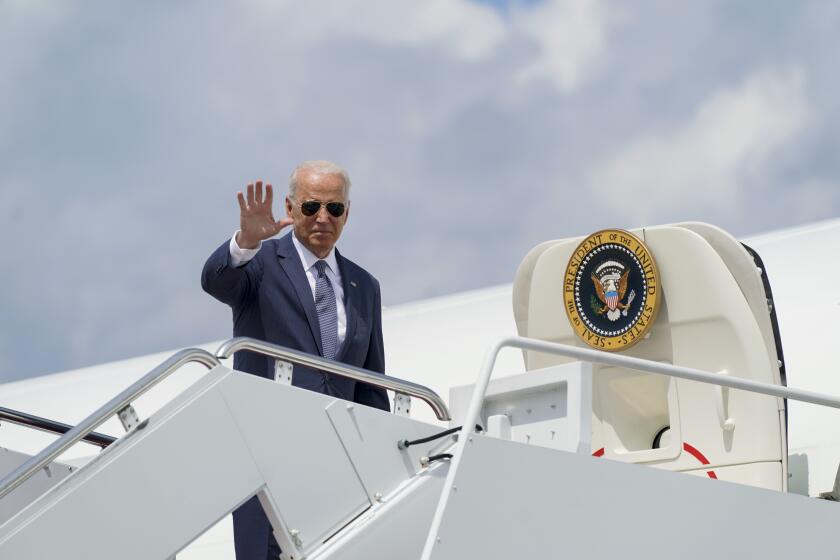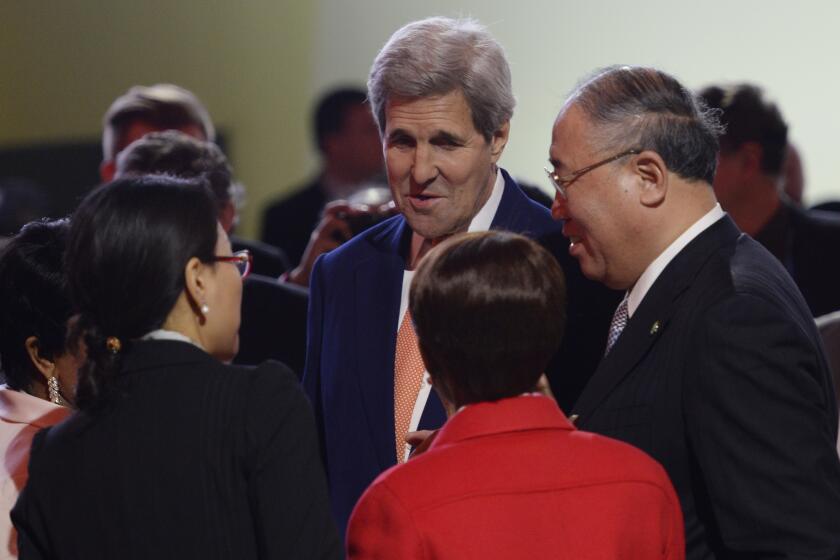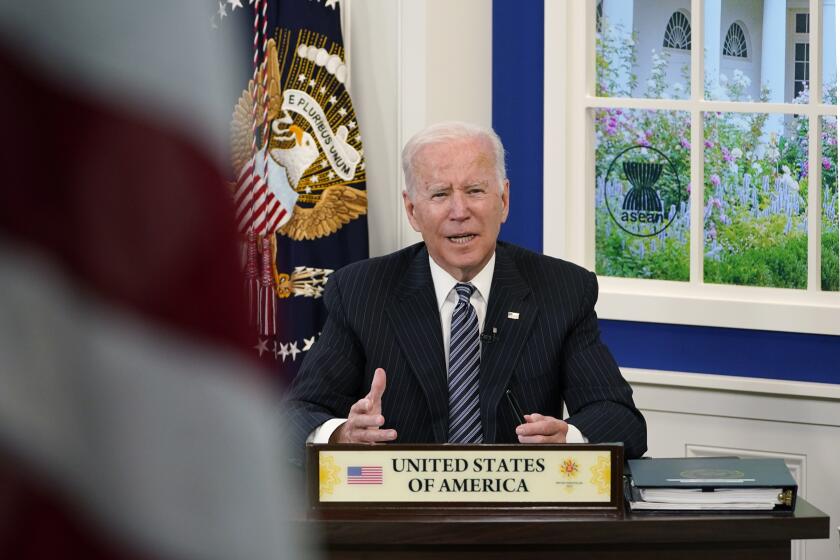Biden strains to show progress at home before summits in Europe

President Biden urges Democrats in Congress to pass his $1.75-trillion social spending plan, insisting that he campaigned on the agenda and that “81 million Americans voted” for it.
WASHINGTON — With his domestic agenda hanging in the balance on Capitol Hill, President Biden is heading to Europe for two international summits where he’ll face questions about how much more the United States can contribute to battles against global warming and the ongoing pandemic.
Biden’s first stop is Rome, where the world’s richest nations are gathering for the G-20 forum, a meeting traditionally focused on economic issues that have been eclipsed by the coronavirus. Next he goes to Glasgow, Scotland, for the United Nations conference on climate change at a time of rising doubts that enough will be done to avoid a dangerous rise in global temperatures.
Ahead of his scheduled departure, Biden headed to Capitol Hill and met with House Democrats to pitch his revised $1.75-trillion plan for investing in education, safety net programs and environmental policies. He’s pushing for a final deal that has proved elusive during months of negotiations as he struggles to bridge the gap between moderate and progressive members of his party.
President Biden is spending two days at the G-20 summit in Rome. Here’s what to watch while he’s there.
The frenetic schedule, which pushed back Biden’s departure on Air Force One, reflects a fraught moment for a president who has strived to demonstrate that the United States remains a democracy capable of bold progress at home and abroad.
Speaking at the White House following his meeting with House Democrats, Biden said Democrats had reached a framework on the spending plan that he said would “fundamentally change the lives of millions of people.”
Although the president’s proposals remain extensive — they would, among other things, create universal preschool for American children — he has been forced to abandon some key policies for reducing greenhouse gas emissions and guaranteeing paid family leave for workers. Biden acknowledged making such compromises was difficult.
“We spent hours and hours and hours, over months and months working on this,” Biden said, describing negotiations with Democratic lawmakers. “Nobody got everything they wanted, even me. But that’s what compromise is. That’s consensus.”
House Speaker Nancy Pelosi (D-San Francisco) pushed for a Thursday vote on related legislation investing in roads, bridges and other infrastructure projects, which she framed as a way to demonstrate progress before Biden’s meetings with world leaders.“When the president gets off that plane, we want him to have a vote of confidence from this Congress,” she told members of her caucus during the meeting with Biden, according to a source familiar with her remarks.
However, the vote was cancelled because progressive Democrats didn’t want to move forward without a final deal on expanding the social safety net.
Administration officials have tried to downplay the importance of reaching a deal before the trip even as Biden strives to do exactly that. White House Press Secretary Jen Psaki said Wednesday that Biden’s counterparts from other countries aren’t bothered by the grinding debate on Capitol Hill.
“They’re seeing we’re making progress,” she said. “They’re sophisticated. They’re seeing we’re on the verge of getting to a deal.”
Although Biden plans to remain engaged with lawmakers while he’s overseas, there’s no clear timeline for how much longer it will take.
“We’re really close, but as you know, really close can last for a while,” said Sen. Brian Schatz (D-Hawaii).
The G-20 brings together powerful autocracies such as Russia and Saudi Arabia, as well as liberal democracies such as Canada and Germany. With the U.S. and China — the world’s largest and second-largest economies — increasingly at odds over trade and security issues, some analysts doubt that the forum can remain a place for the international community to find common ground.
The rest of the world may suffer the consequences if the U.S. and China don’t work together on reducing greenhouse gas emissions.
“I wouldn’t say I’m hugely hopeful about it,” said Thomas Wright, director of the Center on the United States and Europe at the Brookings Institution. “I think it’s a test.”
Biden will likely face a more skeptical reception from America’s traditional allies than he did earlier this year, when he attended the G-7 summit in the seaside resort town of Carbis Bay in England. Back then, he was hailed for reengaging with the international community after President Trump spent four years scorning it.
Now there’s less confidence that Biden will be able to turn the page as he promised, said Heather A. Conley, director of the Europe, Russia and Eurasia Program at the Center for Strategic and International Studies.
“Europe needs a very stable Biden administration,” she said. “It sees, however, that the Biden administration is struggling domestically. It fears that the instincts that brought President Trump to power are back again and that it’s not sure that America can be a partner that it can rely upon.”
Biden rattled allies with his chaotic withdrawal from Afghanistan as the Taliban overthrew the central government in Kabul and swiftly rolled back advances made by women during the American occupation there.
President Biden is flying to Europe for a pair of international conferences this week, but his mind is on Asia.
The president also angered France by forming a new security partnership with Australia and Britain that led Australia to cancel a lucrative contract to buy diesel-powered submarines from the French in favor of working with the U.S. on a new nuclear fleet.
Biden plans to meet with French President Emmanuel Macron while they’re in Rome as part of his effort to mend ties with America’s oldest ally. Josep Borrell, European Union High Representative for Foreign Affairs and Security Policy, told reporters in Washington that he believed the relationship would get back on track.
“Presidents Biden and Macron agreed that things could have been done better. We agree on that,” he said. “But we are not going to be masochists.”
Public health advocates will be carefully watching the G-20 for additional commitments to distribute COVID-19 vaccines to poor countries that remain vulnerable to the pandemic. The international community appears to be falling short of its goal of vaccinating at least 40% of the population of each country by the end of the year.
“This is going to take coordination,” said Dr. Kathleen Neuzil, director of the Center for Vaccine Development and Global Health at the University of Maryland School of Medicine. “There aren’t enough being produced. And the ones we have are not equitably distributed.”
So far, Biden has pledged to donate more vaccine than any other country, with more than 1 billion scheduled to be delivered by next fall.
More challenges await the president in Glasgow, where world leaders are under pressure to increase their commitments to reducing greenhouse gases. Biden has already announced ambitious targets, but the U.S. trajectory is in doubt as Democratic lawmakers wrestle with how to address the problem.
There is tentative agreement to spend about $500 billion, but the policy details have not been finalized. Whatever the final result, it will be far less ambitious than Biden once envisioned.
He originally wanted to use a combination of payments and fines to encourage utilities to abandon fossil fuels and adopt clean energy. However, the idea was scrapped because it couldn’t gain the necessary support of Sen. Joseph Manchin III (D-W.Va.). Now the legislation is likely to include grants and loans to encourage the private sector to reduce emissions.
Nathaniel Keohane, the president of the Center for Climate and Energy Solutions, said the U.S. needs to show the world a credible plan for tackling global warming to rally other countries to the cause.
“The best case scenario is coming to Glasgow with something that actually can close the gap,” he said. “If the U.S. comes in and says, we’re still working on it, it will dramatically hamper its ability to lead in Glasgow.”
Times staff writers Jennifer Haberkorn and Tracy Wilkinson contributed to this report from Washington.
More to Read
Get the L.A. Times Politics newsletter
Deeply reported insights into legislation, politics and policy from Sacramento, Washington and beyond. In your inbox three times per week.
You may occasionally receive promotional content from the Los Angeles Times.














